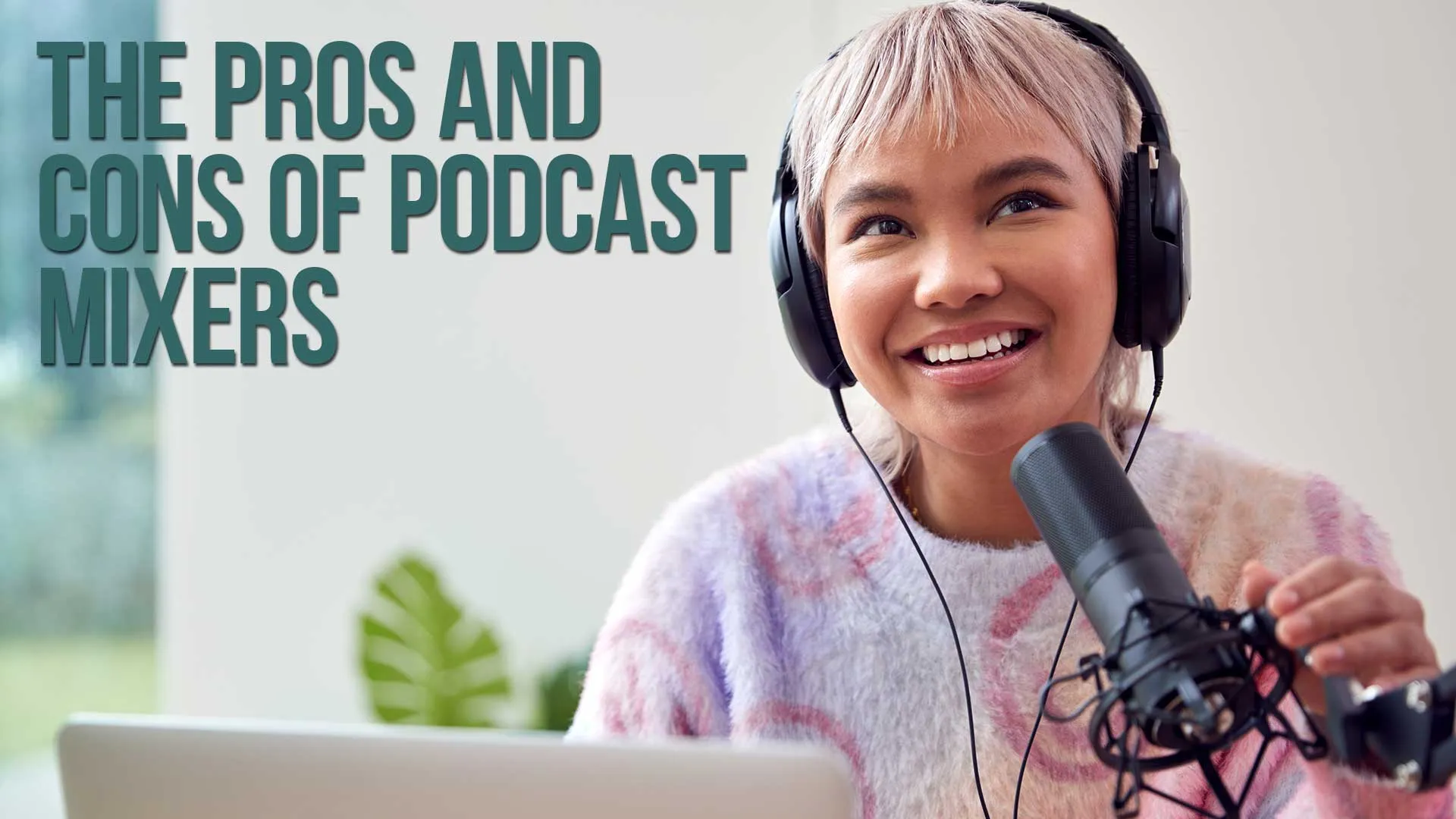If you are starting a podcast or looking to upgrade your podcast equipment, you may be wondering whether you need a podcast mixer.
An audio mixer is a piece of audio equipment that allows you to combine and adjust the sound levels of multiple audio sources, such as microphones, sound effects, and music, into one output.
In this article, we will explore the pros and cons of audio mixers, so you can make an informed decision about whether a mixer is right for your podcast.
If you're ready to buy one of the best audio mixers for podcasting, check out our article about The Best Audio Mixers for Podcasting.
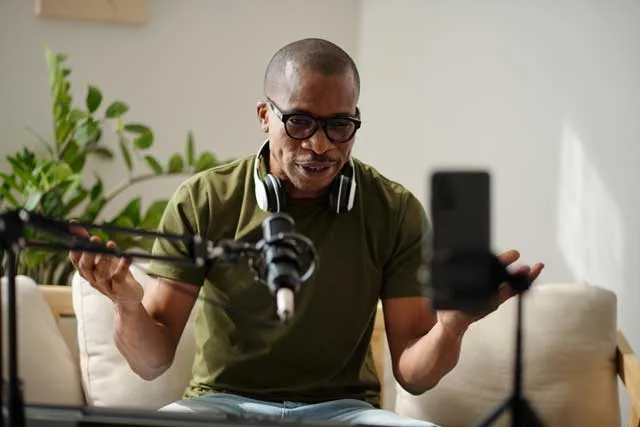
What is a Podcast Mixer?
A podcast mixer, also known as an audio mixer, is an audio interface that allows you to adjust the levels of multiple audio sources and combine them into a single output.
It typically has several XLR inputs for microphones, instruments, and other audio sources, as well as knobs and sliders for adjusting the volume and tone of each input.
Some audio mixers also have built-in effects and EQ, which can help to improve the sound quality of your podcast.
Often audio mixers will have multiple headphone outputs so you (and your guests) can hear yourself while you record.
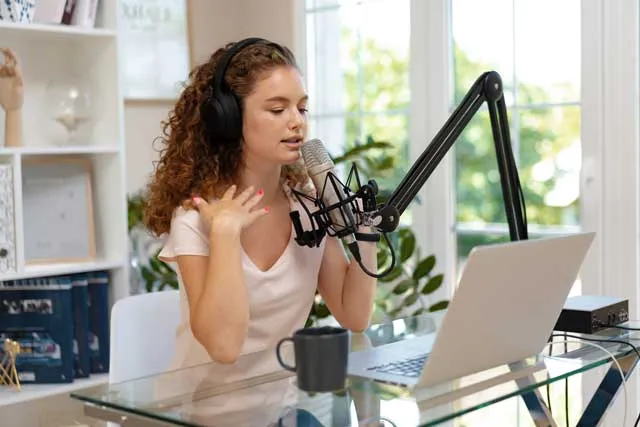
The Pros of Podcast Mixers
- Improved Audio Quality: One of the biggest advantages of using audio mixers is that it can help to improve the overall audio quality of your podcast. By adjusting the levels of each input and applying EQ and effects, you can create a more polished and professional-sounding podcast.
- More Control: Audio mixers you more control over the sound of your podcast. You can adjust the volume and tone of each input to create the perfect blend of voices and music, and you can quickly make adjustments during recording to ensure that everything sounds just right.
- Multiple Inputs: The best podcast mixer typically has multiple microphone inputs, which means that you can connect multiple microphones and other audio sources to the mixer. This is particularly useful if you are recording a podcast with multiple hosts or guests. Plus you have extra stereo inputs to route in things like sound effects. A microphone input is called an XLR input.
- Configurable USB Stereo Audio: Some podcast mixers offer configurable USB stereo audio that can be used to route audio to and from your computer. This allows you to record and mix your podcast recording using software on your computer, which can provide even more control and flexibility.
- Built-in Effects: Some podcast mixers come with built-in effects, such as reverb and delay, which can add depth and dimension to your podcast.
- Individual Volume Control: With a podcast mixer, you can control the volume of each of the XLR inputs individually, which allows you to balance the levels of each voice and sound effect.
- Excellent Sound Quality: Good audio mixers can provide excellent sound quality, with low noise and high-quality preamps that ensure that your podcast sounds clear and professional.
- Multi-Track Recording: Some podcast mixers allow for multi-track recording, which means that you can record each input on a separate track. This makes it easier to edit and mix your podcast later on.
- More Professional Appearance: Having a mixer in your setup can make your podcasting rig look more professional and serious, which can help to attract more listeners and make your podcast stand out.
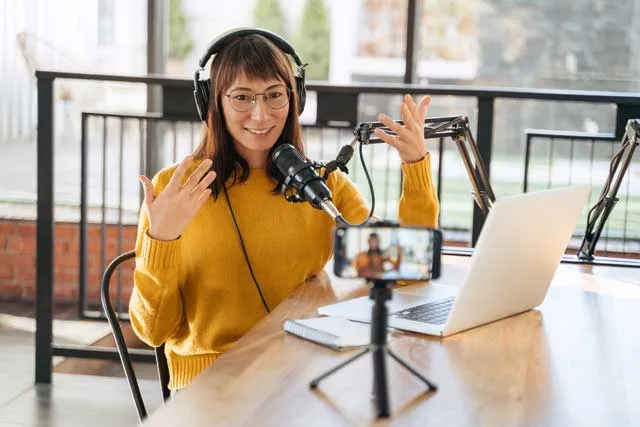
The Cons of Podcast Mixers
- Cost: One of the biggest downsides of mixers for podcasting is the cost. A good mixer can be quite expensive, especially if you need one with multiple inputs and built-in effects.
- Learning Curve: Using a podcast mixer can take some time to learn, especially if you are new to audio mixing. You will need to learn how to adjust the levels of each input, apply effects, and use the mixer to create a polished final product.
- Space: A podcast mixer can take up quite a bit of space on your desk or in your recording studio. If you are working in a small space, a mixer may not be practical.
- Audio Interface may be enough: Depending on your podcasting needs, a USB audio interface or a USB microphone may be enough to capture the sound you want. An audio interface typically has fewer inputs and outputs than a mixer, but it can still provide high-quality sound for your podcast.
- Additional Equipment Needed: To use a podcast mixer, you will likely need additional equipment such as cables, microphones, and headphones. This can add to the overall cost of your podcasting setup.
- Maintenance: Like any piece of electronic equipment, a podcast mixer requires maintenance and occasional repairs. This can add to the overall cost of owning a mixer over time.
- Limited Portability: Podcast mixers are typically larger and heavier than other podcasting equipment, which can make them less portable. If you plan on recording your podcast on the go, a mixer may not be the best option.
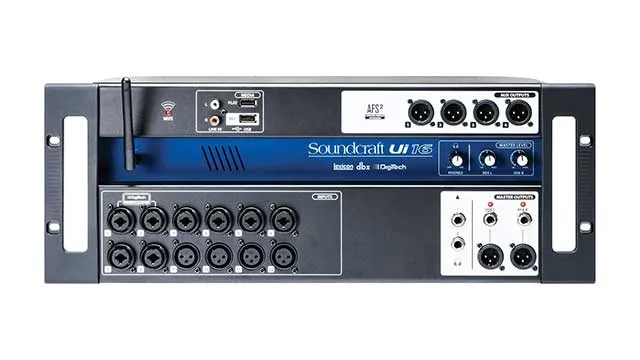
Do You Really Need a Mixer for a Podcast?
Whether you really need a mixer for your podcast depends on your individual needs and goals.
If you are recording a solo podcast or a podcast with only one or two hosts, an audio interface may be enough to capture the sound you want.
An audio interface typically has fewer inputs and outputs than a mixer, but it can still provide high-quality sound for your podcast.
However, if you plan on having multiple guests or want more control over the sound of your podcast, a mixer may be a better option.
A mixer allows you to adjust the levels of each input and create a more polished and professional-sounding podcast.
You might be able to have four XLR inputs with good mic preamps, or even more on an eight channel analogue mixer.
Do You Need a Mixer for a Two Person Podcast?
Whether you need a mixer for a two-person podcast depends on your goals and the specific requirements of your podcast.
If you and your co-host will be recording in the same room and sharing a single microphone, an audio interface may be enough to capture the sound you want.
However, if you plan on recording your podcast with two separate microphones, a mixer may be a better option.
A mixer allows you to adjust the levels of each input and create a more balanced and professional-sounding podcast.
Do You Need an Audio Interface or Mixer for a Podcast?
Whether you need an audio interface or mixer for your podcast depends on your individual needs and goals.
An audio interface is a device that allows you to connect your microphones and other audio sources to your computer, capture analog audio signals, and record and edit your podcast using software on your computer.
A mixer, on the other hand, allows you to adjust the levels of each input and combine them into a single output.
If you plan on having multiple guests or want more control over the sound of your podcast, a mixer may be a better option.
However, if you are recording a solo podcast or a podcast with only one or two hosts, an audio interface may be enough to capture the sound you want.

Podcast Mixers Frequently Asked Questions
What does a podcast mixer do?
A podcast mixer allows you to adjust the levels of multiple audio sources and combine them into a single output. It typically has several inputs and mic preamps for microphones, instruments, and other audio sources, as well as knobs and sliders for adjusting the volume and tone of each input.
Do you really need a mixer for a podcast?
Whether you really need a mixer for your podcast depends on your individual needs and goals. If you are recording a solo podcast or a podcast with only one or two hosts, an audio interface may be enough to capture the sound you want. However, if you plan on having multiple guests or want more control over the sound of your podcast, a mixer may be a better option.
Do you need a mixer for a two-person podcast?
Whether you need a mixer for a two-person podcast depends on your goals and the specific requirements of your podcast. If you and your co-host will be recording in the same room and sharing a single microphone, an audio interface may be enough to capture the sound you want. However, if you plan on recording your podcast with two separate microphones, a mixer may be a better option.
Do you need an audio interface or mixer for a podcast?
Whether you need an audio interface or mixer for your podcast depends on your individual needs and goals. An audio interface is a device that allows you to connect your microphones and other audio sources to your computer, and record and edit your podcast using software on your computer. A mixer, on the other hand, allows you to adjust the levels of each input and combine them into a single output. An audio interface is a simpler solution, but an audio mixer gives you a lot more options.
How many inputs should a podcast mixer have?
The number of analog inputs you need in a podcast mixer depends on the number of hosts and guests you plan on having in your podcast. If you plan on having only one or two hosts, a mixer with two or three inputs may be sufficient. If you plan on having multiple guests, you may need a mixer with four microphone inputs.
What is phantom power on a podcast mixer?
Phantom power is a feature on some podcast mixers that provides power to condenser microphones. Condenser microphones require power to operate, and phantom power provides that power down the microphone cable from the microphone inputs of the audio mixer.
What are mic preamps on a podcast mixer?
Mic preamps are amplifiers that are built into podcast mixers and provide gain to the signal from the microphone inputs. They help to boost the signal and make it louder and clearer.
What are sound pads on a podcast mixer?
Sound pads, also known as programmable sound pads, are buttons on a podcast mixer that allow you to play pre-recorded sounds or jingles during your podcast. They can be used to add sound effects or music to your podcast.
What are the best podcast mixers?
There are many podcast mixers on the market, and the best one for you will depend on your individual needs and goals. Some of the best podcast mixers include the Behringer Xenyx 1204USB, the Soundcraft Ghost (featuring high quality Soundcraft Ghost Mic Preamps), and the Zoom LiveTrak L-8. These mixers offer a range of features, including multiple inputs, lots of audio tracks, built-in effects, and high-quality sound preamps.
How Many Headphone Outputs Do I Need on an Audio Mixer for Podcasting?
The number of headphone outputs you need on an audio mixer for podcasting depends on the number of hosts and guests you plan on having in your podcast. If you plan on having only one or two hosts, a mixer with two headphone outputs may be sufficient. If you plan on having multiple guests, you may need a mixer with three or four headphone outputs to ensure that everyone can hear the audio.
Do I Need Stereo Outputs on an Audio Mixer for Podcasting?
Whether you need outputs on an audio mixer for podcasting depends on your individual needs and goals. If you are recording a solo podcast or a podcast with only one or two hosts, a mono output may be enough to capture the sound you want. However, if you plan on having multiple guests or want to capture a more immersive sound experience, stereo may be necessary.
How Can I Record Phone Calls for my Podcast?
There are several ways to record phone calls for your podcast. You can use a smartphone app or a computer software program, or you can use a dedicated hardware device that allows you to connect your phone to your mixer or audio interface. It is important to ensure that you have the necessary permissions and legal agreements in place before recording phone calls for your podcast.
Do The Best Audio Mixers Have Built In Sound Effects?
Some of the best audio mixers on the market have built-in sound effects that allow you to add music, jingles, or sound effects to your podcast. These built-in effects can be a convenient way to add production value to your podcast, but it is important to choose a mixer that offers high-quality sound effects that are appropriate for your podcast's style and content.
What are the Main Features of the Beringer Xenyx?
The Behringer Xenyx is a popular audio mixer that offers a range of features for podcasters, including multiple microphone inputs, phantom power, and built-in effects. It also includes a USB audio interface, which allows you to connect the mixer to your computer and record and edit your podcast using software on your computer. The Xenyx is known for its high-quality sound preamps and its compact size, which makes it a convenient option for podcasters who need a mixer that is easy to transport.
Do Any Audio Mixers Offer USB Connectivity?
Many modern audio mixers offer USB connectivity, which allows you to connect the mixer to your computer and record and edit your podcast using software on your computer. USB connectivity can be a convenient feature that simplifies the recording and editing process, and it can also help to ensure high-quality sound. It is important to choose a mixer that offers reliable and stable USB connectivity for optimal performance.
Do Any Audio Mixers Offer Bluetooth Connectivity?
Some modern audio mixers offer Bluetooth connectivity, which allows you to connect your mixer to your smartphone or other Bluetooth-enabled device. This feature can be convenient for podcasters who want to play music or sound effects from their phone or who want to take phone calls during their podcast. However, it is important to choose a mixer that offers stable and reliable Bluetooth for the best performance.
What Are Some of the Qualities of the Best Audio Mixers?
The best podcast mixers offer a range of features and qualities, including multiple microphone inputs, high-quality sound preamps, phantom power, built-in effects, and USB or Bluetooth connectivity. The best podcast mixers also offer intuitive controls and an easy-to-use interface that makes it easy to adjust levels and settings while recording. It is important to choose a mixer that offers the features and qualities that best suit your podcasting needs and goals.
Do Any Audio Interfaces Include Six Headphone Outputs?
While it is rare, some high-end audio interfaces include up to six headphone outputs, which can be useful for podcasters who record in a studio with multiple hosts or guests. These interfaces typically include other advanced features such as high-quality preamps, low latency, and configurable USB stereo audio interfaces. It is important to choose an audio interface that offers the right number of headphone outputs for your specific podcasting needs.
What is a Digital Mixer?
A digital mixer is a type of audio mixer that uses digital signal processing (DSP) to control and adjust audio levels and effects. Digital mixers offer a range of features and benefits for podcasters, including more precise control over audio levels, built-in effects, and the ability to save and recall settings. They are often more complex and expensive than analog mixers, but they offer more advanced features and more precise control over your podcast's sound.
Conclusion
When it comes to podcasting, the best podcast mixer can be a valuable tool for improving the sound quality of your podcast. A mixer allows you to adjust the levels of multiple audio sources and combine them into a single output, which can result in a more polished and professional-sounding podcast.
However, there are also some drawbacks to using a mixer.
Mixers can be expensive, and they require additional equipment such as cables, microphones, and headphones. They are also larger and less portable than other podcasting equipment. A simple setup with USB microphones might work for you.
Ultimately, whether you need a mixer for your podcast will depend on your individual needs and goals. If you plan on having multiple guests or want more control over the sound of your podcast, a mixer may be a good investment. However, if you are recording a solo podcast or a podcast with only one or two hosts, a high quality audio interface may be enough to capture the sound you want.
Regardless of whether you choose to use a mixer, it is important to invest in high-quality audio equipment and to use editing software to fine-tune your podcast's sound. With the best podcast mixer and techniques, you can create a podcast that sounds professional and engaging, and that keeps your listeners coming back for more.

About the Author
Joseph Nilo has been working professionally in all aspects of audio and video production for over twenty years. His day-to-day work finds him working as a video editor, 2D and 3D motion graphics designer, voiceover artist and audio engineer, and colorist for corporate projects and feature films.
Pro Audio Production Related Posts
Top 9 Condenser Microphones for Recording Voice and Vocals
Best Microphones For YouTube Videos 2022
Best Gaming Headsets with Good Microphones
The Ultimate Guide to the Premiere Pro Essential Sound Panel
Best External Wired and Wireless Mics for iPhone
The Pros and Cons of Podcast Mixers
7 Best Audio Mixers for Podcasting in 2023
The 8 Best USB Audio Interfaces For Podcasters and Musicians 2023
- What Is A Podcast Mixer?
- The Pros Of Podcast Mixers
- The Cons Of Podcast Mixers
- Do You Really Need A Mixer For A Podcast?
- Do You Need A Mixer For A Two Person Podcast?
- Do You Need An Audio Interface Or Mixer For A Podcast?
Pro Audio Production Related Posts
Top 9 Condenser Microphones for Recording Voice and Vocals
Best Microphones For YouTube Videos 2022
Best Gaming Headsets with Good Microphones
The Ultimate Guide to the Premiere Pro Essential Sound Panel
Best External Wired and Wireless Mics for iPhone
The Pros and Cons of Podcast Mixers
7 Best Audio Mixers for Podcasting in 2023
The 8 Best USB Audio Interfaces For Podcasters and Musicians 2023
